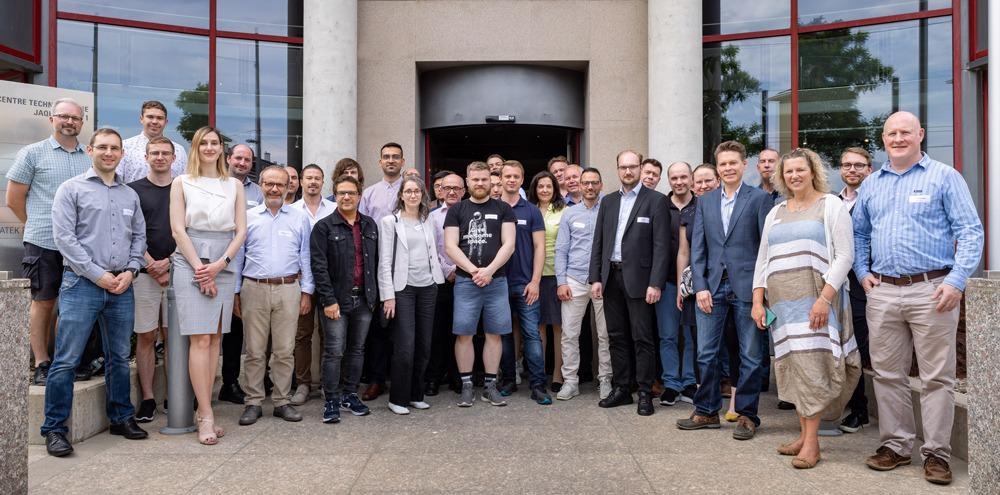From CSEMReviewed by Mychealla RiceMay 25 2022
CSEM is coordinating the Swiss cluster of a € 33 million European consortium. The Energy ECS (Electronics, Components, and Systems) project will tackle the energy challenges unfolding in the e-mobility domain and as part of the green-energy transition. The project’s aims are in line with Europe’s target to achieve carbon neutrality by 2050. The Swiss consortium includes key enterprises Swiss Airtainer, Fixposition, and ams International. CSEM has hosted the first year consortium meeting in Neuchâtel on the 19-20 May.

Image Credit: CSEM / Reto Duriet
New European Business and Technology Ecosystem
E-mobility is an integral player within the green energy transition. It has a direct role in reducing emissions, and its increased adoption is indirectly improving grid stability. Moreover, e-mobility is helping to accelerate the transition away from fossil fuels, allowing renewables like wind and solar to have greater prominence within the energy mix.
Launched in June 2021, Energy ECS aims to develop a series of ECS technologies that enhance and digitalize e-mobility systems.
In doing so, the project has “the potential to strengthen Europe’s position in the areas of smart grid and mobility, thereby contributing to the European Green Deal objectives,” notes Anton Chichkov, Programme Officer at Electronic Components and Systems for European Leadership Joint Undertaking. The project will additionally work towards mitigating the challenges that electric vehicles pose on the energy system.
CSEM Connecting Innovation
Energy ECS brings together 30 partners from 8 different European counties who cover a range of industries and expertise areas. The consortium is organized like an umbrella organization, with TietoEVRY, Finland, tasked with the overall coordination of the project. CSEM, the renowned research and technology organization (RTO) will coordinate the Swiss cluster. CSEM has over thirty-five years of experience connecting innovation to the industry at a European level.
Advancing e-mobility
CSEM’s researchers have two objectives in the Energy ECS project. Firstly, its engineers will focus on improving the recharging capabilities of drones. Secondly, it has begun working with consortium part-ner Swiss Airtainer to develop advanced high-tech solar components and systems for marine and air containers.
Swiss Airtainer hopes to expand the pharma industry by optimizing the industry’s supply chain using a temperature-controlled and energy-independent air cargo container solution that they have developed. Through Energy ECS, Swiss Airtainer is building a real-time intelligent and independent control system and communication ecosystem. This is of particular interest for those involved in the transportation of medical products, e.g., vaccines, as it could help guarantee the supply cold chain. (More info: PR)
Consortium partner Fixposition provides B2B precise positioning solutions for the autonomous vehicle market to enable safer and more automated operations. Within Energy ECS, they will focus on the autonomous navigation of e-buses on pre-defined routes, which can connect with automated drones at specified landing points. The automated flying and recharging of drones ‘on the go’ will extend the capabilities of this advanced technology. Drones will not only be able to fly further, but it means that they can also be part of more complex missions where they are powerful tools in data gathering, delivery, and security, to name but a few of their applications.
Lastly, but not least, ams International, specialists in VCSEL, optics, illumination, and 3D systems, will contribute to Energy ECS by developing a technology demonstrator that enables advanced driver monitoring using a 3D system. Driver drowsiness, for example, has been shown to increase crash risk and this new system aims to mitigate risks like these.
Innovating Today for Tomorrow’s Future
Ari Järvelä, Head of Operations at TietoEVRY, the overall project coordinator for Energy ECS, concludes that “addressing problems now will help our society transition towards a low-carbon economy. E-mobility is an excellent area to drive the transition in practice. Collaborating in ecosystems is the way towards innovation and joint benefits for all the partners involved. TietoEVRY and all our partners are proud that they are helping drive European innovation and technology ecosystems as a part of the Energy ECS project.”
Key Digital Technologies Joint Undertaking
The ECSEL Joint Undertaking scheme enables the Swiss industry, SMEs, and RTOs the chance to collaborate with key European players in the domain of ECS including the whole value chain, while creating new local working ecosystems. Its successor, Key Digital Technologies (KDT) had its kick-off recently.
“I’m extremely delighted to see that Innosuisse has managed to find adequate transition measures for the Swiss partners who will now be part of KDT, and that we can continue to work side by side with the European innovation leaders under the same operating rules as ECSEL,” comments Erika Györvary, Lead of European Affairs at CSEM and Swiss Coordinator of Energy ECS.